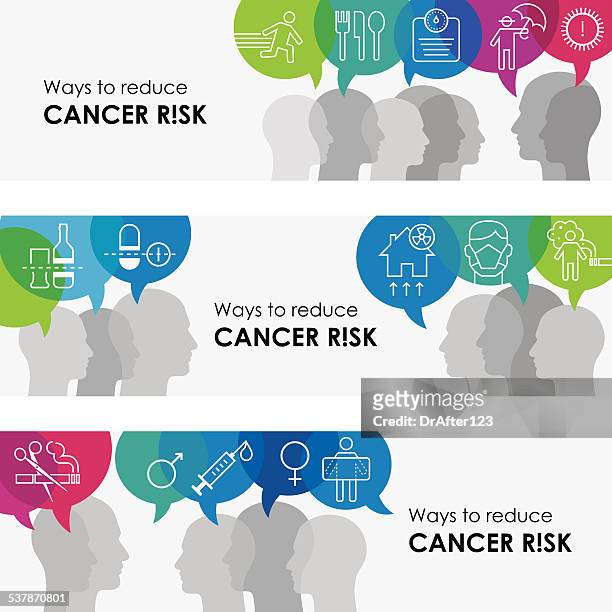Cancer Risk Factors
Recognising Your Risks: An Examination of Cancer Risk Factaors
The intricate process of cancer formation is impacted by a number of variables. Even though there are certain things beyond our control, being aware of your risk factors can help you make more educated decisions and possibly lower your risk of developing cancer. The primary types of cancer risk factors are covered in this blog post.
Table of Contents

Lifestyle Decisions and Practices
Cancer Risk Factors
Your risk of cancer is greatly impacted by several lifestyle choices:
- Use of Tobacco: Smoking is the single biggest risk factor for lung cancer, bladder cancer, and head and neck cancer, among other cancers. Products made of smokeless tobacco are likewise very dangerous.
- Diet and Exercise: A diet heavy in red meat, processed foods, and unhealthy fats, together with inactivity, raises the risk of cancer. On the other hand, frequent exercise paired with a diet high in fruits, vegetables, and healthy grains can help reduce your risk.
- Overweight: A higher risk of several cancers, such as pancreatic, colon, and breast cancer, is associated with excess body weight.
- Alcohol Use: Drinking too much alcohol increases your chance of developing breast, liver, throat, and mouth cancers.
- Sun Exposure: One of the main risk factors for skin cancer is prolonged exposure to ultraviolet (UV) radiation from the sun. Seek for shade, put on protective clothes, and use sunscreen with an SPF of 30 or higher as ways to protect yourself from the sun.
- Sexual Behaviour: Cervical cancer and a few other malignancies have been related to specific STDs, such as the human papillomavirus (HPV).
Exposure to Environment
Cancer Risk Factors
The following environmental factors may also raise the risk of cancer:
- Radiation Exposure: An increased risk of cancer can result from prolonged exposure to ionising radiation, which includes radiation from CT scans, X-rays, and environmental sources.
- Chemical Carcinogens: Certain chemicals, such as asbestos, benzene, and certain pesticides, might cause cancer if they are exposed to them at work or in the environment.
- Air Pollution: Long-term exposure to urban air pollution has been associated with a higher risk of lung cancer.
Biological Propensity
Cancer Risk Factors
Although genetic alterations inherited from parents can increase a person’s risk of cancer, most malignancies are not directly inherited. Certain genes involved in cell development and repair may have these mutations.
- Family History: Your risk may be increased if you have a parent, sibling, child, or other close relative who has a certain cancer. But having a family history of cancer does not mean you will get it.
- Genetic Syndromes Inherited: Ovarian and breast cancer risk are greatly increased by some inherited genetic disorders, such as BRCA1 and BRCA2 mutations.
Extra Risk Elements
Cancer Risk Factors
Other variables that may affect the risk of cancer include:
- Age: As cells collect mutations over time, age is associated with an increased chance of cancer development.
- Weakened Immune System: Some cancers may be more common in people whose immune systems have been weakened by HIV/AIDS or drugs used during organ donation.
- Hormonal Factors: Certain hormone-sensitive malignancies, such as breast cancer, are more likely to develop when a person experiences hormonal changes during life, such as puberty, pregnancy, and menopause.
Strategies for Reducing Risk
Cancer Risk Factors
The good news is that a large number of cancer risk factors are changeable. Here are a few strategies to lower your risk:
- Keep Up a Healthy Lifestyle: Eat a well-balanced diet, get regular exercise, and keep your weight in check.
- Limit Alcohol Consumption: Try to limit or completely avoid alcohol.
- Exercise Sun Safety: Seek for shade, put on protective clothes, and apply sunscreen to protect your skin from the sun.
- Avoid Tobacco Use: The most effective way to lower your risk of cancer is to stop smoking.
- Minimise Your Exposure to Carcinogens: Take precautions to reduce your exposure to probable environmental and occupational dangers.
- Genetic Counselling: To determine your personal risk, take into account genetic counselling if there is a significant family history of cancer.
- Frequent Screenings: Early detection of cancer is crucial for the best course of therapy. Mammograms for breast cancer and colonoscopies for colon cancer are two examples of routine cancer screenings.
Cancer Risk Factors
Recall that this material is intended solely for general understanding. See your physician for specific guidance on reducing your risk of cancer. You can take proactive measures towards a healthier future by being aware of risk factors and implementing healthy lifestyle habits.


